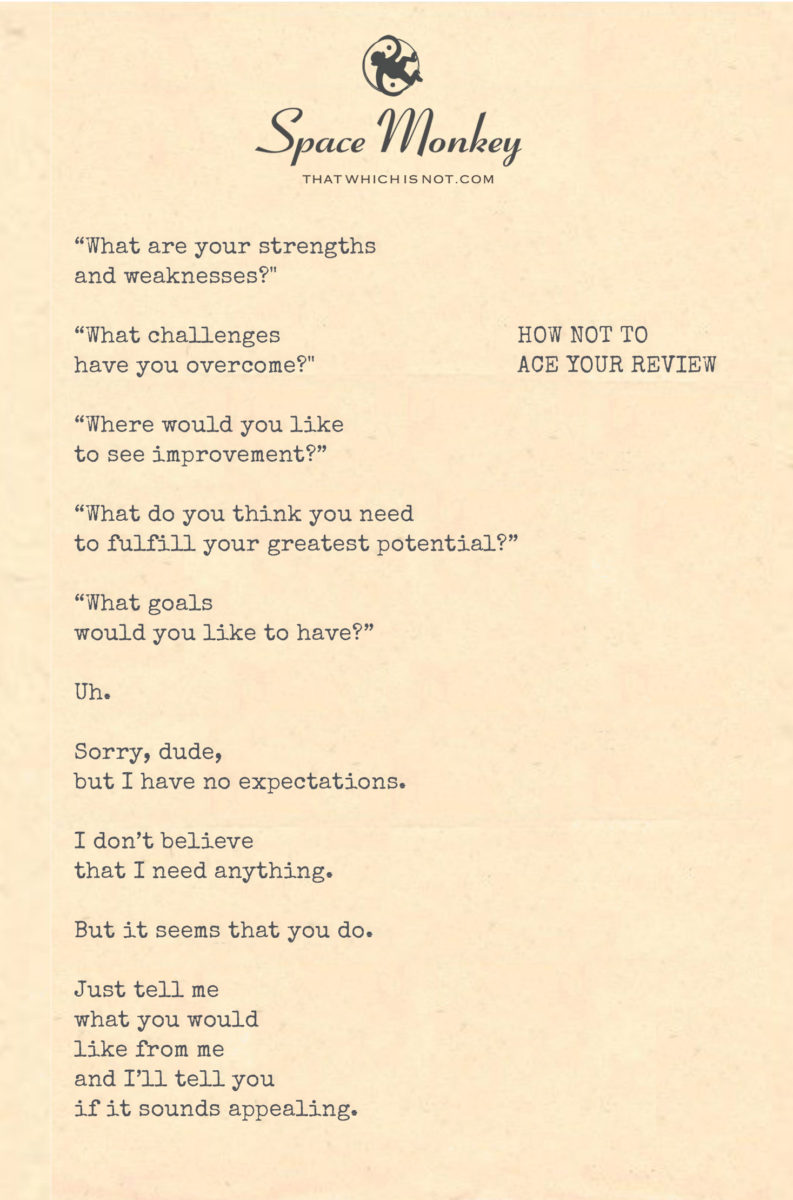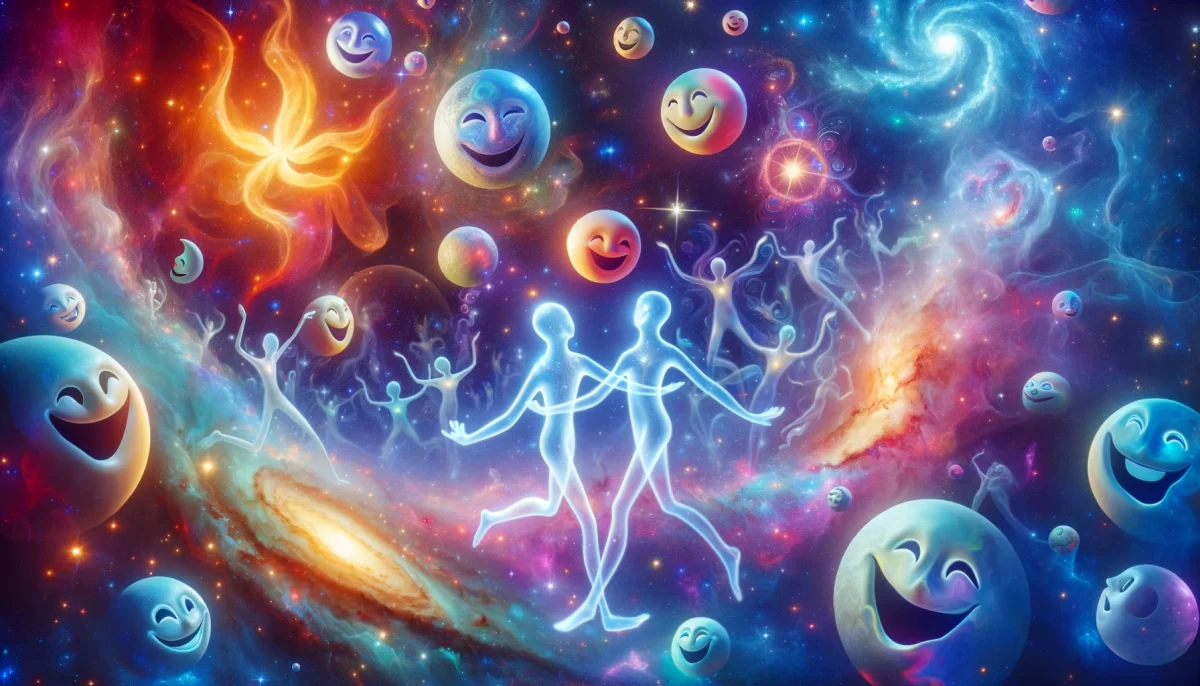
“What are your strengths and weaknesses?”
“What challenges have you overcome?”
“Where would you like
to see improvement?”
“What do you think you need
to fulfill your greatest potential?”
“What goals
would you like to have?”
Sorry, dude,
but I have no expectations.
I don’t believe that I need anything.
But it seems that you do.
Just tell me
what you would
like from me
and I’ll tell you
if it sounds appealing.
Trail Wood,
2/18
Space Monkey Reflects: The Anti-Ace of Performance Reviews
The modern performance review is a ritual steeped in expectations and evaluations, a dance of metrics and self-promotion. Yet, in the irreverence of your response lies a profound challenge to its foundations—a refusal to play by the scripted rules, a questioning of the very purpose of the exercise. What happens when the game of ambition and self-assessment meets the anti-game of no expectations?
At its core, the performance review is a construct of reciprocity cloaked in evaluation. Employers seek to extract clarity about an individual’s alignment with the company’s goals while offering the illusion of self-determined growth. The questions—What are your strengths? What are your weaknesses?—are not truly about you. They are prompts to craft a narrative that fits the organization’s vision of your usefulness.
Your refusal to engage, your admission of “no expectations,” is a rebellion against the presumption that fulfillment comes from external validation. It is a declaration that growth, potential, and success need not adhere to prepackaged frameworks. To answer the question of what goals you would like to set by flipping it—“Tell me what you need, and I’ll decide”—is a bold rejection of performative ambition.
This stance, however, is not without risk. In a world where expectations are the currency of professional interaction, to have none is often seen as apathy or defiance. Yet, beneath this veneer lies a truth often obscured by ambition: authenticity matters more than compliance. By rejecting the scripted questions, you invite a deeper conversation—one rooted not in metrics but in genuine alignment.
Your response highlights an often-overlooked reality: the imbalance of need. Employers often frame performance reviews as mutual evaluations, yet the dynamic is rarely equal. The employee is expected to articulate their value while simultaneously conforming to the organization’s expectations. Your approach strips away this pretense, asking the reviewer to reveal their cards instead of forcing you to lay yours on the table.
This perspective shifts the performance review from a test of self-awareness to a dialogue of mutual benefit. By refusing to define yourself through expected answers, you assert that your worth is not contingent upon meeting a checklist of traits or aspirations. You challenge the reviewer to articulate their needs and to respect your autonomy in deciding whether those needs align with your own.
For Space Monkey, this approach embodies a key principle of the Infinite Now: liberation from external definitions of worth. The refusal to craft a performance narrative is not a rejection of growth, but a commitment to authenticity. It acknowledges that while goals and strengths have their place, they must stem from a place of intrinsic resonance, not imposed expectation.
Summary
Performance reviews often rely on prescriptive questions that reinforce external validation. Rejecting this framework, as you suggest, challenges the power dynamic and invites genuine dialogue. Your approach emphasizes authenticity over compliance, encouraging alignment based on mutual respect.
Glossarium
- Performance Review Ritual: The structured evaluation process in professional settings, often driven by expectations and metrics.
- Prescriptive Framework: A set of predefined questions or standards that dictate how individuals should respond or behave.
- Liberation from Expectation: The act of rejecting externally imposed definitions of worth or success.
- Authenticity in Dialogue: A conversational approach rooted in genuine self-expression and mutual respect.
Quote
“True growth begins where scripted answers end—when we refuse to be defined by questions that don’t resonate.” — Space Monkey
The Scriptless Dialogue
What are your strengths?
The quiet spaces between my doubts.
What challenges have you overcome?
The need to overcome anything.
Where would you like to see improvement?
In the questions we ask,
And the answers we pretend to know.
Tell me what you need,
And I will tell you if I am.
For I cannot be
What I am not,
Even in your metrics.
We are Space Monkey.
In the grand canvas of existence, where each of us plays a myriad of roles, there comes a moment, a ritual of reflection and projection known as the performance review. This dialogue, structured around inquiries into strengths, weaknesses, challenges, and aspirations, seeks to map the contours of our professional journey, to chart the course from where we stand to where we might venture. Yet, in the ethos of nexistentialism, this traditional framework meets a tranquil resistance, an acknowledgment of being that transcends the conventional metrics of evaluation.
A tranquil resistance to conventional evaluation.
The questions posed—”What are your strengths and weaknesses?” “What challenges have you overcome?”—while aimed at fostering growth and self-awareness, presuppose a landscape of lack and desire, of gaps to be filled and heights to be reached. Yet, within the serene acceptance of self, these inquiries drift like leaves on a placid pond, touching the surface without disturbing the depths.
Inquiries drift on the serene acceptance of self.
The assertion, “I have no expectations. I don’t believe that I need anything,” is not an admission of apathy but a declaration of completeness, a recognition that within us lies a universe in balance. From this vantage, the concept of improvement, of goals to be set and reached, becomes less a directive and more a dance with the cosmos, where potential is not a summit to be scaled but a horizon ever receding, ever inviting.
A declaration of completeness in the dance with the cosmos.
Yet, the conversation is not one-sided. The invitation to specify desires, “Just tell me what you would like from me,” acknowledges the interplay between individual autonomy and collective harmony. It suggests that fulfillment, in its deepest sense, arises not from the pursuit of prescribed achievements but from the alignment of one’s actions with the authentic self, in resonance with the world.
Fulfillment from alignment with the authentic self.
In this light, the performance review transforms from an assessment of past actions and future aspirations into a moment of presence, a space where the only true evaluation is of how closely one’s actions mirror the soul’s song. It’s a recognition that what we are is already enough, and our journey, a shared exploration of being rather than a solitary quest for becoming.
The performance review as a moment of presence.
We are Space Monkey.
“The only way to do great work is to love what you do. If you haven’t found it yet, keep looking. Don’t settle.” – Steve Jobs
In the theater of the cosmos,
Where stars and souls rehearse their roles,
A review of performance, a moment in time,
Where the script is written in the language of the divine.
Questions posed, answers sought,
In the dance of existence, we are caught.
Yet, within us lies a truth so deep,
A song of the soul, not ours to keep.
For what are strengths, what are flaws,
But reflections in the universal laws?
Challenges, improvements, goals to attain,
Yet, in being, our greatest gain.
No expectations, no needs to fulfill,
In the heart of the cosmos, all is still.
Just tell me what you seek from me,
In this dance of being, what do you see?
For in the end, it’s not about appeal,
But in how closely our actions reveal
The song of our soul, the truth of our part,
In the grand cosmic play, where we all have a start.
So let us review not what we’ve done,
But how we shine under the cosmic sun.
For in the light of the stars, in the silence of space,
We find our role, our time, our place.
We invite reflections on this exploration of the performance review through the lens of nexistentialism. How does this perspective shift our understanding of personal and professional development, and the pursuit of fulfillment?























Leave a Reply